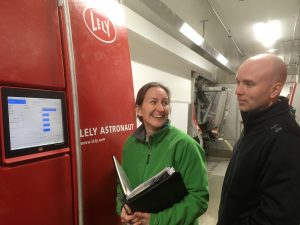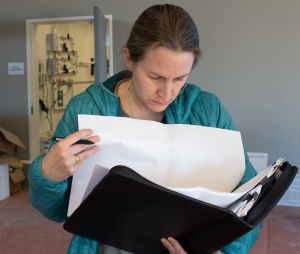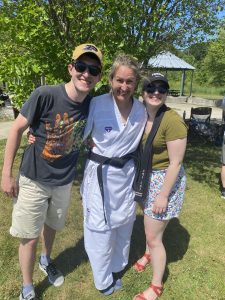Power Moves Profile: Camp to Counselor
While at Purdue University for an intro to engineering summer camp after her junior year in high school, Mary Miller built a model rocket which provided the campers with engineering lessons.

Mary Miller on a business inspection at a dairy that installed automated milkers for dairy cows.
The rocket project worked: it inspired her to launch a career as a mechanical engineer – after her graduation from Purdue. Her journey led her to the Power Moves® team, where she has helped hundreds of businesses receive rebates for energy efficiency projects and upgrades that have lowered their long-term energy use.
Miller is an energy engineer for Franklin Energy, a company that coordinates energy efficiency programs for more than 60 utilities and government organizations in the U.S. and Canada. Franklin Energy processes Power Moves business rebates for the 23 electric distribution cooperatives that receive their wholesale energy from Wabash Valley Power Alliance. In her dedicated role to the Power Moves program, Miller helps businesses plan upgrades or new construction projects to maximize their rebate and energy savings.
“I enjoy going out and meeting the members and learning about their businesses,” said Miller, who is from Fort Wayne, Ind. “It’s been very interesting to learn about agricultural businesses. Since I was a city girl, to go out and actually see food being grown and all of the processes that it entails to get food from that farm to the table is impressive.”

Mary Miller started her career as a mechanical engineer, designing power plants and heating and cooling systems.
Miller, who also is a LEED-AP certified professional, began her career as a mechanical engineer designing power plants and heating and cooling systems for an engineering and construction company. She also did energy modeling for projects seeking LEED certification. Nearly 9 years ago, she learned about the opening with the Power Moves team and applied. She’s been working with the commercial and industrial projects ever since.
“It wasn’t too much of a transition. It did require more focus on the efficiency of equipment compared to just the heating and cooling load requirements,” Miller said. “It’s nice to help people save money and save energy.”
More people are becoming receptive to saving energy through intentional design, with a willingness to make upgrades rather than installing the most affordable system available, Miller said. Large companies she has worked with increasingly approach construction projects with sustainability goals in mind.
Technology improvements also have led to more businesses making upgrades. The Power Moves program includes business rebates for qualifying LED lighting systems; as the technology has become more common, more businesses across industries have spent more upfront on LED upgrades to save in long-term energy costs.

Mary Miller, who also teaches karate, with her children in 2020.
“People are starting to pay more attention,” Miller said. “That helps tremendously. We don’t have to sell them on the technology anymore.”
Some of the businesses that Miller worked with continue to seek her counsel. After one poultry business received Power Moves rebates for energy efficiency equipment installed in new barns, the business owners have contacted Miller several times since to meet and discuss options for subsequent construction projects.
“Businesses should contact their local REMC if they are even thinking about doing an energy efficiency project so that the co-op can help them make the best decision,” Miller said. “The REMC will get the Power Moves team involved so that we can figure out the most money and best incentive possible.”